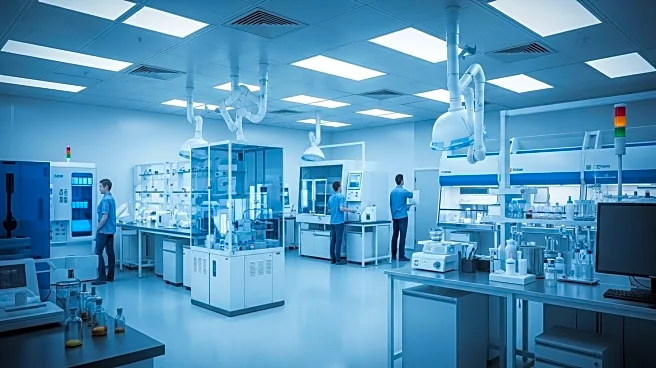What's Happening?
GlaxoSmithKline (GSK) has announced a significant $30 billion investment in the United States, focusing on manufacturing and research and development (R&D). This announcement coincides with President Donald Trump's state visit to the United Kingdom. The investment plan includes the construction of new biopharma factories and laboratories, with a particular emphasis on advanced digital technologies and artificial intelligence (AI). GSK's initiative aims to create hundreds of highly skilled jobs in the U.S. and enhance the company's capacity for producing medical and auto-injector devices. The investment will be distributed across GSK's existing sites in Pennsylvania, North Carolina, Maryland, and Montana, with a new biologics facility planned for Upper Merion, Pennsylvania. This move is part of a broader trend among pharmaceutical companies to onshore manufacturing in response to tariff pressures.
Why It's Important?
GSK's investment is a strategic response to the evolving landscape of pharmaceutical manufacturing and trade policies. By expanding its U.S. operations, GSK is positioning itself to mitigate the impact of tariffs on imported medicines, a concern heightened by recent policy changes under the Inflation Reduction Act. The investment underscores the importance of the U.S. market, which accounts for a significant portion of GSK's revenue. Additionally, the focus on AI and digital technologies reflects a broader industry shift towards innovation in drug development and manufacturing processes. This move is likely to enhance GSK's competitive edge in the biopharmaceutical sector and contribute to economic growth through job creation and technological advancement.
What's Next?
GSK's investment is expected to unfold over the next five years, with the construction of new facilities and the implementation of advanced technologies. The company's commitment to expanding its U.S. operations may prompt other pharmaceutical firms to consider similar investments, potentially leading to increased competition and innovation in the sector. Stakeholders, including policymakers and industry leaders, will likely monitor the impact of these developments on the U.S. pharmaceutical landscape and the broader economy. The collaboration between the UK and the U.S., highlighted by the recent Tech Prosperity Deal, may further facilitate advancements in AI and healthcare innovation.
Beyond the Headlines
The investment by GSK also highlights the ethical and strategic considerations of pharmaceutical manufacturing in a globalized economy. By focusing on onshoring, GSK is addressing concerns about supply chain resilience and national security in the healthcare sector. The emphasis on AI and digital technologies raises questions about the future of work and the skills required in the pharmaceutical industry. As companies like GSK invest in cutting-edge technologies, there may be a need for workforce retraining and education to ensure that employees can adapt to new roles and responsibilities.









